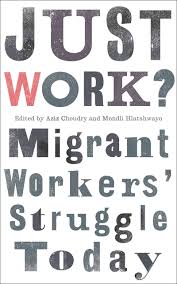New volume Just Work? Migrant Workers’ Struggles Today, edited by Aziz Choudry and Mondli Hlatshwayo, gives a platform to the struggles of migrant workers propping up economies in the Global North and South through grounded, optimistic analysis built on first-hand experience. Paul Clewett finds this collection both a fascinating read and a welcome antidote to migration scholarship that has hitherto disproportionately focused on the West.
Just Work? Migrant Workers’ Struggles Today. Aziz Choudry and Mondli Hlatshwayo (eds). Pluto Press. 2015.
 The pressures of economic meltdown in 2008, exacerbated by a refugee crisis of historic proportions, may be slowly undoing the human rights consensus so painstakingly constructed since the end of the Second World War. With diminishing protection from international and domestic law, the need for migrant and native workers to form alliances and stake a claim for political recognition is more important than ever. Yet, as a xenophobic nationalism stirs from its slumber in a frightening number of countries, divisions between the citizen and the migrant worker persist.
The pressures of economic meltdown in 2008, exacerbated by a refugee crisis of historic proportions, may be slowly undoing the human rights consensus so painstakingly constructed since the end of the Second World War. With diminishing protection from international and domestic law, the need for migrant and native workers to form alliances and stake a claim for political recognition is more important than ever. Yet, as a xenophobic nationalism stirs from its slumber in a frightening number of countries, divisions between the citizen and the migrant worker persist.
‘Only a crisis’, state Edward Miller and Dennis Maga, two of thirteen essayists that make up this tribute to migrant workers and activists around the world, ‘brings real change’. The authors draw the quotation from two of the godparents of neoliberalism, Milton and Rose Friedman, to epitomise how champions of austerity, privatisation and labour market ‘flexibility’ have pounced on shocks in the global economic system to impose ever more precarious conditions on workers around the world. But might the twin migration and economic crises that have emerged in the last decade prompt resistance and the beginning of a reversal?
For all the horrific stories of migrant worker abuses we have become accustomed to seeing in the Middle East, Asia and elsewhere, the grounded but optimistic perspective of Just Work? Migrant Workers’ Struggles Today, edited by Aziz Choudry and Mondli Hlatshwayo, makes it clear that labour has been anything but the inevitable prey of rampant, unseen neoliberal power. The book gives a platform to the struggles – extraordinary and mundane, successful and not – of migrant workers propping up economies in the Global North and South. It offers no lamentation for lost human rights, and there is barely an international convention in sight. Instead, a grounded analysis built on first-hand experience lets the scholar-activist authors document the workplace struggles of migrants against employers, governments and – at times – colleagues too.
 Image Credit: Migrant workers in Mechanicsville, VA, United State of America, 20 September 2013 (US Department of Agriculture, Lance Cheung, CC 2.0).
Image Credit: Migrant workers in Mechanicsville, VA, United State of America, 20 September 2013 (US Department of Agriculture, Lance Cheung, CC 2.0).
The practical lessons this offers tend to some of the missing links in the migration policy fads du jour. Marek Čaněk’s contribution on migrant forestry workers in the Czech Republic, for instance, brings home how redundant the migration and development breakthroughs hailed by the development elite become if migrants cannot claim their labour rights – after all, what good are remittances if wages are stolen? – while demonstrating how professional NGOs, sensitive to risking delicate relationships with government, are not always in the best position to agitate for change.
Vasco Pedrina’s historical analysis of Swiss unions, meanwhile, details the very practical challenges of organising immigrant workers in an increasingly hostile national context. Pedrina offers, perhaps inadvertently, an analysis of the powerful role trade unions can play in facilitating the integration of foreign workers in their destination countries. The creation of ‘special structures for migrant workers’ within the union saw migrant workers receive language and skills training, the facilitation of pre-departure programmes in seasonal workers’ countries of origin and real progress in social cohesion between native and migrant workers driven (and paid for) by the workers themselves. Policymakers wondering how to integrate Europe’s sizeable number of new arrivals might want to take note.
The book is also compelling for its ability to draw together case studies from the Global North and South without recourse to the dry jargon or jaded ideas of international development theory and practice. Baba Ayelabola skillfully sets the parameters of the West African regional integration project against the backdrop of Nigeria’s transition from the state-building of the postcolonial era to its emergence as a regional powerhouse. He shows how governmental policies – as much as wage differentials and livelihood prospects – can condition migration flows, and how the state’s impulse to discipline migrant labour can escalate anti-immigration sentiment in public discourse, and vice versa. In so doing, he makes incisive links between inward-looking migration policy and the stunted Economic Community of West African States (ECOWAS) regional integration process.
The book’s ambitious global agenda at once intrigues and limits. The scope is impressive, with cases covered in eleven countries across five continents. But a number of chapters are unable to move beyond the descriptive elements of their case and develop fuller arguments about the implications of their findings, leaving some passages feeling somewhat flat. The consequence is that some of the ‘everyday’ stories of migrant workers and organisers, while fascinating in their own right, seem detached from Choudry and Hlatshwayo’s enticing introductory chapter and theoretical framing.
Just Work? nevertheless proves itself to be a fascinating read and a welcome antidote to migration scholarship that continues to disproportionately obsess over the West. Migrants, activists and students should read this book for its effective delivery of a sound, sanguine, whirlwind tour of migrant labour around the world. But policymakers and analysts too might be surprised how much they learn for their own work, not least how the power of organised labour – precisely because of the potential of mass movements to disrupt entrenched habits – can help solve complex societal issues.
Paul Clewett is a migration analyst with Farsight (www.seefar.org). He previously worked for the Migration Policy Institute Europe (www.migrationpolicy.org) where he published on a range of migration topics including labour mobility, integration, and migration and development. He is a member of the board of trustees at The Swift Centre (www.theswift.org.uk), a London-based youth charity promoting development through non-formal learning. Twitter: @pclewett
Note: This review gives the views of the author, and not the position of the LSE Review of Books blog, or of the London School of Economics.







